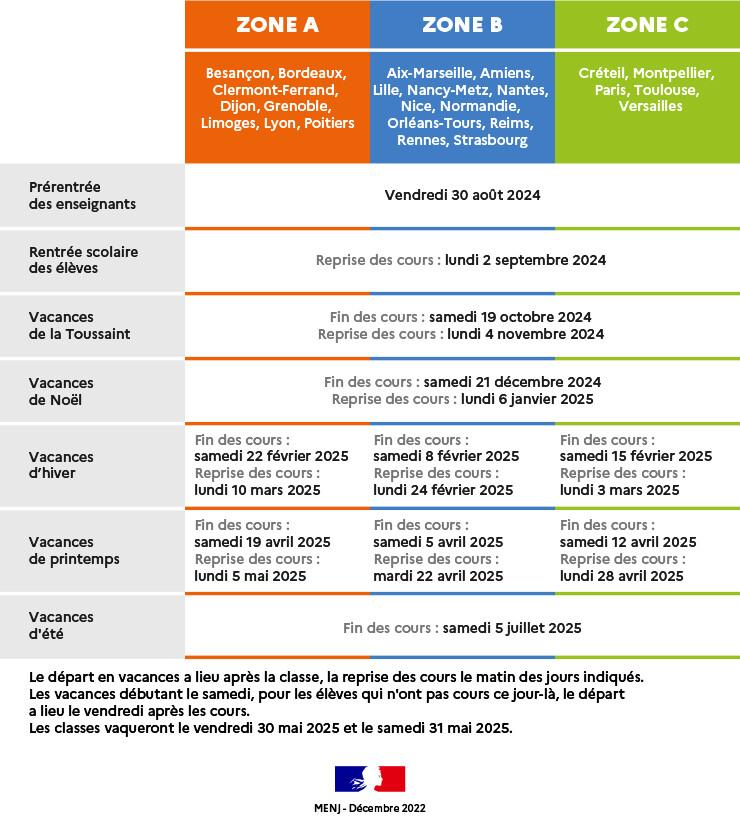As students across France prepare to return to classrooms this autumn, the 2024 rentrée brings a series of notable changes to the nation’s education system. From updated curricula and new teaching initiatives to adjusted schedules and enhanced support measures, schools are set to undergo significant transformations aimed at improving learning outcomes and addressing evolving challenges. This article explores the key modifications taking effect in French schools this September, providing an overview of what parents, teachers, and pupils can expect as the academic year begins.
New Curriculum Updates Aim to Boost Digital Skills and Innovation in Classrooms
The Ministry of Education is rolling out significant changes designed to better prepare students for a digital future. From the coming school year, classrooms across France will see an increased emphasis on coding, robotics, and digital media literacy integrated into the existing curriculum. These initiatives are aimed at nurturing creativity and innovation among young learners, equipping them with practical skills that align with the rapidly evolving technology landscape. Teachers will receive tailored training programs to effectively deliver this new content, ensuring a smooth transition and impactful learning experiences.
Key elements of the revised curriculum include:
- Introduction to programming logic starting from primary school.
- Hands-on robotics workshops designed to develop problem-solving skills.
- Digital citizenship education to promote responsible internet usage.
- Enhanced collaborative projects using digital tools to foster teamwork and creativity.
| New Curriculum Aspect | Target Age Group | Expected Outcomes |
|---|---|---|
| Programming Fundamentals | 6-11 years | Basic coding concepts; logical thinking |
| Robotics Workshops | 9-14 years | Hands-on tech skills; teamwork |
| Digital Citizenship | All ages | Safe and ethical online behaviour |
Enhanced Teacher Training Programs Focus on Inclusivity and Student Mental Health
Starting this autumn, French teachers will benefit from revamped professional development programs designed to foster a more inclusive educational environment. These new training initiatives place a strong emphasis on understanding and accommodating diverse learning needs, cultural backgrounds, and abilities within the classroom. Educators will receive specialized workshops on adaptive teaching methods and practical strategies to support students with disabilities, language barriers, or socio-economic challenges, ensuring that no child is left behind in the evolving school landscape.
Equally important is the enhanced focus on student mental health, reflecting growing concerns about wellbeing among young learners. Teachers will be equipped with tools to identify early signs of mental distress and to create supportive classroom atmospheres that prioritize emotional safety. This approach includes collaboration with school psychologists and counselors, as well as the integration of mindfulness and stress management techniques into daily practice. The broadened scope of these training programs aims to build resilience and promote a positive, nurturing school climate for all students.
- Inclusivity Workshops: Strategies for diverse classrooms
- Mental Health First Aid: Recognizing and responding to needs
- Collaborative Learning: Engaging all students actively
- Emotional Wellbeing: Promoting mindfulness and stress relief
| Training Module | Duration | Focus Area |
|---|---|---|
| Inclusive Education | 3 Days | Diversity & Accessibility |
| Student Mental Health | 2 Days | Emotional Support |
| Collaborative Strategies | 1 Day | Peer Engagement |
Stricter Hygiene Protocols and Infrastructure Improvements to Ensure Safer Learning Environments
In response to ongoing health concerns, French schools are rolling out enhanced sanitation measures to foster safer learning spaces for students and staff. These updates include the installation of touchless hand sanitizers in classrooms and common areas, alongside a rigorous daily cleaning regime targeting high-contact surfaces such as door handles, desks, and computer equipment. Additionally, schools are encouraged to increase ventilation in classrooms by keeping windows open whenever possible, further reducing the risk of airborne infections.
Infrastructure upgrades are underway to support these hygiene efforts. Many schools will benefit from the addition of new handwashing stations and upgraded restroom facilities designed to handle increased usage efficiently. The Ministry of Education has set new standards, outlined in the table below, aimed at maintaining these improved conditions throughout the academic year.
| Facility | Improvement | Expected Benefit |
|---|---|---|
| Classrooms | Touchless hand sanitizer dispensers | Reduced surface contamination |
| Restrooms | Additional sinks and automatic taps | Improved hygiene compliance |
| Common Areas | Enhanced ventilation systems | Minimized airborne germ transmission |
- Daily surface sanitation protocols are mandatory in all schools.
- New hygiene training sessions will be provided to staff ahead of reopening.
- Regular monitoring to ensure compliance with these new standards will be conducted.
Parental Engagement Strategies Recommended to Support Student Success at Home and School
To foster stronger connections between families and schools, educators across France are emphasizing practical, inclusive strategies that encourage parental involvement. Schools are increasingly hosting regular workshops and information sessions where parents can engage with teachers, discuss curriculum changes, and gain insight into their child’s learning journey. These sessions create a transparent environment that empowers families to support homework, monitor progress, and address challenges early. Additionally, the increased use of digital platforms allows parents to stay updated and communicate seamlessly with educators, bridging the gap between classroom and home.
Apart from organized meetings, schools are also promoting collaborative activities such as cultural events, volunteer opportunities, and student-led presentations that invite parents to take an active role. Such initiatives build community spirit and emphasize the importance of education beyond academics. The table below highlights key parental engagement methods and the benefits observed by schools this autumn:
| Strategy | Purpose | Reported Benefits |
|---|---|---|
| Interactive Workshops | Educate parents on curriculum | Improved homework support |
| Digital Communication Tools | Ongoing updates & messaging | Timely issue resolution |
| Family Engagement Events | Enhance community ties | Increased parental attendance |
| Volunteer Programs | Encourage active involvement | Deeper student motivation |
Final Thoughts
As the 2024 autumn rentrée approaches, schools across France prepare to implement a range of new measures and adjustments designed to enhance educational outcomes and adapt to evolving societal needs. From curriculum updates and infrastructural improvements to shifts in pedagogical approaches, the changes set for this academic year reflect ongoing efforts to modernize the French education system. Families, educators, and students alike will be navigating these developments, which aim to support a more inclusive and forward-looking learning environment. Stay informed with The Connexion for further updates as the school year unfolds.




